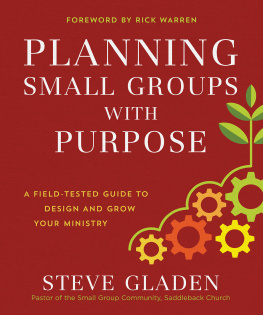Planning Focus Groups
David L. Morgan
with Alice U. Scannell
Planning Focus Groups
Focus Group Kit
Copyright 1998 by Sage Publications, Inc.
All rights reserved. No part of this book may be reproduced or utilized in any form or by any means, electronic or mechanical, including photocopying, recording, or by any information storage and retrieval system, without permission in writing from the publisher.
For information:
 | SAGE Publications, Inc.
2455 Teller Road
Thousand Oaks, California 91320
E-mail:
SAGE Publications Ltd.
6 Bonhill Street
London EC2A 4PU
United Kingdom
SAGE Publications India Pvt. Ltd.
M-32 Market
Greater Kailash I
New Delhi 110 048 India |
Printed in the United States of America
Library of Congress Cataloging-in-Publication Data
Morgan, David L., Krueger, Richard A.
The focus group kit.
p. cm.
Includes bibliographical references and indexes.
Contents: v. 1. The focus group guidebook/David L. Morgan, v. 2. Planning focus groups/David L. Morgan, v. 3. Developing questions for focus groups/Richard A. Krueger. v. 4. Moderating focus groups/Richard A. Krueger. v. 5. Involving community members in focus groups/Richard A. Krueger, Jean A. King. v. 6. Analyzing and reporting focus group results/Richard A. Krueger.
ISBN 0-7619-0760-2 (pbk.: The focus group kit: alk. paper)
1. Focus groups. I. Title. II. Series. III. Morgan, David L. IV Krueger, Richard A.
H61.28K7781997
001.433dc21
97-21135
ISBN 0-7619-0818-8 (v. 1 pbk.)
ISBN 0-7619-0817-X (v. 2 pbk.)
ISBN 0-7619-0819-6 (v. 3 pbk.)
ISBN 0-7619-0821-8 (v. 4 pbk.)
ISBN 0-7619-0820-X (v. 5 pbk.)
ISBN 0-7619-0816-1 (v. 6 pbk.)
This book is printed on acid-free paper.
03 10 9 8 7 6
| Acquiring Editor: | Marquita Flemming |
| Editorial Assistant: | Frances Borghi |
| Production Editor: | Diana E. Axelsen |
| Production Assistant: | Karen Wiley |
| Typesetter/Designer: | Janelle LeMaster |
| Cover Designer: | Ravi Balasuriya |
| Cover Illustration: | Anahid Moradkhan |
| Print Buyer: | Anna Chin |
Detailed Table of Contents
Acknowledgments
I want to start by thanking my coauthor, Alice Scannell, who wrote the essential first drafts for . Alice also conducted several interviews with colleagues who helped expand our understanding of how people use focus groups, including Bruce Bayley, of the Center for Outcomes Research and Education at Providence Medical Center; Adam Davis, of Davis and Hibbitts Incorporated; and Laura Neidhart, of Bardsley and Neidhart. Bruce provided insights into the concerns of those who contract with others for focus groups. Laura shared her knowledge of various aspects of the focus group industry, including the role that professional focus group facilities play. And Adam helped us understand the issues that professional focus group researchers encounter when working for others.
I would also like to acknowledge the numerous students and colleagues whose focus group projects I have been a part of. Some of what is here is indeed my own hard-won experience about how to plan for effective focus groups. I have learned at least as much, however, by sharing in the wide range of uses that my students and colleagues have found for focus groups.
Introduction to the Focus Group Kit
W e welcome you to this series of books on focus group interviewing. We hope that you find this series helpful. In this section, we would like to tell you a bit about our past work with focus groups, the factors that led to the creation of this series, and an overview of how the book is organized.
We began our studies of focus group interviewing about the same time. Our academic backgrounds were different (David in sociology and Richard in program evaluation) and yet we were both drawn to focus group interviewing in the 1980s. We both had books published in 1988 on focus group interviewing that resulted from your research and practice with the methodology. At that time we were unaware of one anothers work and were pleased to begin a collegial relationship. Over the years weve continued our studies independently, and occasionally our paths crossed and we had an opportunity to work together. In the last decade, weve worked together in writing articles, sharing advice on research studies, and teaching classes. We have generally found that we shared many common thoughts and concerns about focus group interviewing.
During the 1990s, we found that interest in focus groups continued and we both prepared second editions for our 1988 books. In 1995, the staff at Sage Publications asked us to consider developing a more in-depth treatment of focus group interviewing that would allow for more detail and guide researchers beyond the basic issues. We pondered the request and thought about how the materials might be presented. We weighed a variety of options and finally developed the kit in its present form. We developed this kit in an effort to help guide both novices and experts.
In these books the authors have occasionally chosen to use the word we. Although the authors share many common experiences with focus groups, our approaches can and do vary, as we hope is the case with other researchers as well. When you see the word we in the books of this series, it typically refers to a judgment decision by the specific author(s) of that particular volume. Much of what the authors have learned about focus groups has been acquired, absorbed, and assimilated from the experiences of others. We use we in circumstances where one of us personally has experienced a situation that has been verified by another researcher or when a practice or behavior has become standard accepted practice by a body of focus group moderators. The use of I, on the other hand, tends to refer to situations and experiences that one of us has witnessed that may not have been verified by other researchers.
In terms of content, we decided on six volumes, each representing a separate theme. The volumes include the following:
Volume 1:The Focus Group Guidebook
This volume provides a general introduction to focus group research. The central topics are the appropriate reasons for using focus groups and what you can expect to accomplish with them. This book is intended to help those who are new to focus groups.
Volume 2:Planning Focus Groups
This volume covers the wide range of practical tasks that need to get done in the course of a research project using focus groups. A major topic is making the basic decisions about the groups format, such as the size of the groups, their composition, the total number of groups, and so forth.
Volume 3:Developing Questions for Focus Groups
This book describes a practical process for identifying powerful themes and then offers an easy-to-understand strategy for translating those themes into questions. This book helps make the process of developing good questions doable by outlining a process and offering lots of examples.










